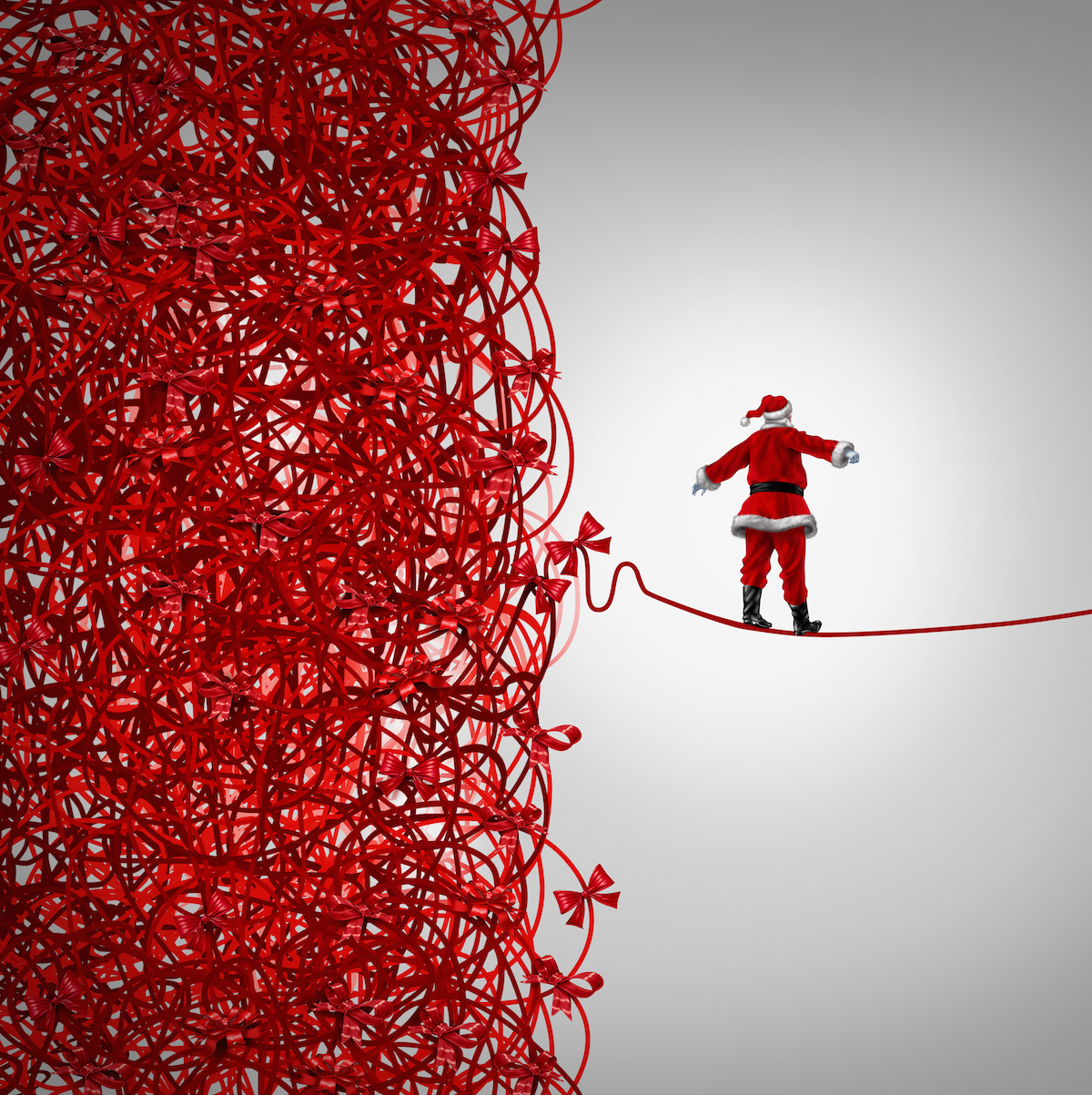Stop the Self-Blame: Learn Compassionate Responsibility Instead

Accountability and blame are not the same.
Imagine this scenario:
Your good friend Trish calls you upset. “I’m such an idiot,” she says. “I was in a huge hurry to get to a meeting at work, so I backed out of the driveway really fast. I wasn’t paying attention, and I ran right over the mailbox. It destroyed the mailbox and put a huge dent in the back bumper of my car. I’m such a moron!”
Take a moment to think about how you would respond. What might you say to Trish? Would you say:
“Trish, you’ve lived in that house for ten years. Had you not noticed where the mailbox is? What a dolt!”
Or would you be more likely to say:
“Trish, don’t talk like that. Everybody makes mistakes. Don’t be so hard on yourself!”
I’m willing to bet that you would say the second option. Because you would never be as hard on your friend as she is on herself.
Now imagine yourself in Trish’s place. How angry would you be at yourself for making this mistake? What would you say to yourself?
How could I be such a fool?
I’m more trouble than I am good.
I’m a bad person.
Why can’t I learn?
These are comments that many fine people say to themselves when they make mistakes. These kind and caring people would never say anything like that to a friend, a child, a spouse, or anyone for that matter. Let’s see how the above comments come across when directed outward at another person, rather at oneself. Imagine saying these sentences to a friend.
How could you be such a fool?
You’re more trouble than you are good.
You’re a bad person.
Why can’t you learn?
Imagine the damage these comments would do to your friend or spouse, and to your relationship with him or her. That is the damage that you are doing to yourself when you say these things to yourself.
There’s a particular group of people who are more prone to treating themselves so harshly: those who were raised with Childhood Emotional Neglect.
If you were raised by a parent who ignored you and/or your mistakes (an aspect of Childhood Emotional Neglect), you didn’t get to internalize a parent’s voice of Compassionate Responsibility.
Compassionate Responsibility: holding yourself accountable for your misstep while also having compassion for yourself. Keep in mind that responsibility is not the same as blame.
Here’s what a parent says to her child during a moment of Compassionate Responsibility: “Everyone makes mistakes sometimes. Let’s figure out what you did wrong here and how to prevent this mistake in the future. Let’s learn from this mistake. Then we’ll let go of it and move on.”
From these few short sentences, this fortunate child is learning the vital life lessons that make up Compassionate Responsibility. She is learning how to keep her own mistakes in perspective; that they are not the end of the world, and that everyone makes them. She is learning that it is possible to learn from her mistakes and that there is no point in dwelling on them. Beyond that, she is internalizing her mother’s (or father’s) voice. Over time, it will become her own. Then it will talk her through all of the mistakes that she will make throughout her life. You can see that there is no blame involved here.
If you were raised by a parent who, for whatever reason, was not able to provide you with this even, reasonable, accountable yet forgiving voice, you may have to develop it for yourself as an adult. Here are some tips to help you:
- Become aware of the damaging things you say to yourself. Track it by recording each negative, blaming comment you make. Start a special list on your phone, on your computer, or a piece of paper, and try to catch yourself each time. Awareness is the first step to changing it.
- Focus on compassion. Strive to have the same compassion for yourself that you have for the other people in your life. Imagine that someone you care about made the same mistake you just made. What would you say to them? That’s what you should say to yourself.
- Follow these steps: When you make a mistake, make a conscious effort to talk yourself through it. What can I learn from this? How can I prevent this in the future? Then put the mistake behind you and move on.
Childhood Emotional Neglect can be invisible and difficult to remember so it can be hard to know if you have it. To find out, Take The Emotional Neglect Questionnaire.
To learn more about Compassionate Responsibility and Childhood Emotional Neglect, see EmotionalNeglect.com and the book, Running on Empty.
A version of this post was originally published on psychcentral.com. It has been reposted here with the permission of the author.
The Best Kept Secret to Getting Unstuck: Face Your Core Feelings

At 34 years old, Garrett is doing well in life. He has a good job and a girlfriend he hopes to marry. So Garrett is confused about why, each time he is alone, a sad feeling sneaks up on him. To prevent this from happening, Garrett stays as busy as he possibly can. He avoids being home alone, driving alone, or being unoccupied. When he is forced to be, he always cranks up his music or has a TV show playing on a screen to distract him.
Jolene is very intelligent and has loads of potential. But she lives alone in a dingy apartment and struggles to earn a living as the office manager of a failing business. Jolene is frustrated by her circumstances, yet she is held back from trying for more. She will do anything to avoid a painful feeling that overcomes her each time she thinks about taking a risk such as starting college, applying for a better job, or going on a date. So she never thinks about it.
Lizzy is a 48-year-old Executive Chef at a thriving, popular restaurant. She runs the restaurant with clean efficiency, and kindness toward all who work for her. People see Lizzy as competent, confident and happy. But inside, she struggles. When something goes wrong (as it often does) in her large, busy kitchen, Lizzy immediately gets a very unpleasant feeling which stays the whole day. Lizzy works long and hard to prevent errors and oversights so that she won’t have to experience that bad feeling.
At first glimpse Garrett, Jolene and Lizzy might seem to have little in common. But they are exactly alike in one very key way: They all have a Core Feeling that has power over them, and it affects how they are living their lives. And none of them is consciously aware that this is happening.
Core Feelings
In truth, Core Feelings dwell all around you. They are in the people you know and among your family and friends. Everywhere. But no one talks about Core Feelings. Only therapists use this term, and yet becoming aware of your Core Feelings can change how you live your life.
A Core Feeling is a powerful emotion that’s based in your childhood and which comes and goes throughout your lifespan.
Children are like little computers whose brains are being programmed by their parents. The “software” for their lives is being set up by their parents and their families; the rules, expectations, feelings, and values that surround children are absorbed into their little brains. This all gets wired into them. It becomes a part of who they are. It defines a big part of who they will become as adults. It becomes a part of what they will feel as adults.
The folks most vulnerable to being ruled by their Core Feelings are the ones who grew up in families that did not teach them how emotions work. These are usually families who rarely discuss or address the feelings of their members. These are families that are, by definition, raising the children with Childhood Emotional Neglect or CEN.
If your parents fail to respond to your emotions as they raise you, they fail to teach you how to recognize, tolerate, manage, or express your feelings. This leaves you sitting with old feelings and, unfortunately, old, unprocessed emotions do not go away.
A Core Feeling is the one emotion that you experienced the most often, or intensely, growing up. It becomes embedded in the software of your brain. As an adult, this feeling is very real, and can at times be very strong.
Throughout the decades of your life, you are not always feeling it. But it dogs you. It hangs around on the sidelines waiting to break through to you. It tends to come, unbidden when you’re alone, undistracted, or otherwise vulnerable to it. Or it gets touched off by specific current events that activate it.
Not everyone has a Core Feeling, but many people do. Therapists know about Core Feelings and often identify them in their patients. Typically, though, they are viewed as an unpleasant burden. Most folks hope that if they avoid and ignore their core feeling, it will eventually go away.
Unfortunately, however, nothing could be further from the truth:
3 Surprising Facts About Your Core Feeling
- Your Core Feeling is a pipeline to your childhood. It represents unresolved issues from the past. It has great value to you.
- When you avoid and ignore your Core Feeling, you are actually making it stronger.
- The only way to make your Core Feeling go away is to allow yourself to feel it, discern its message, and process it.
To understand how a Core Feeling develops, check back for my future blog which will describe exactly how Garrett, Jolene, and Lizzy got their Core Feeling, and how each of them processes it.
But now I’d like to focus on what to do with your Core Feeling if you have one.
The 8 Steps to Process A Core Feeling
- Become aware of your Core Feeling. Find the words to describe it.
- Pay attention when you’re feeling it. Is it at certain times, or when you’re with certain people, or under particular circumstances?
- Stop avoiding or fighting the feeling. When it comes, make an effort to sit with it, tolerate it and feel it. Even the most painful Core Feelings must be felt and processed.
- As you sit with your Core Feeling, think about when you experienced this feeling as a child. Think about what in your current life touches it off. If you can, put your thoughts in writing as you sit with it.
- Ask yourself what messages the feeling might be bringing to you. What does this feeling say about you? Why did you feel this as a child?
- Share your Core Feeling and your thoughts about it with a trusted person.
- See if you can willingly generate your Core Feeling on demand. This is a part of taking control of it.
- Learn all you can about Childhood Emotional Neglect. When you start down the path of healing CEN, you change your relationship with your own emotions, making it less likely to develop new core feelings or suffer from old ones.
Welcoming, accepting and sorting through your Core Feeling is a way to manage it. Essentially, you are stopping it from controlling you. You’re turning the tables and are taking control of it.
By listening to its message, you are building your resilience in three ways. You are increasing your tolerance for pain; you are building your self-knowledge by understanding yourself better, and you are improving your emotional health by working through an unresolved issue.
In other words, when you are tired of running, turn around and face it.
To learn more about your emotions, how they work, and how they may be affecting you, see EmotionalNeglect.com and the book, Running on Empty: Overcome Your Childhood Emotional Neglect.
This article was first published on psychcentral.com. It is reproduced here with the author’s permission.
What Triggers Abandonment Issues? 4 Ways to Heal

What Triggers Abandonment Issues? Anything That Hints of Abandonment.
One day, you’re going through your life just fine. Going to work, seeing your friends, and all of the normal everyday things. Then, without warning, your world turns dark.
Suddenly you feel a need to protect yourself from those you trusted yesterday, and you feel a sense of anger, hurt, and rejection in relationships that made you happy before. Suddenly, you feel lost, alone, and bereft.
Why the change? Did a random mood come over you? Did depression set in? Maybe, but probably not. What probably happened was that you encountered a surprise trigger; one you didn’t expect or see.
Someone or something triggered your abandonment issues. And your feelings about yourself, your life, and someone you love have all been cast in a different light.
Such is the power of abandonment issues.
Abandonment issues come from being wounded by an important person in your life unexpectedly leaving you. For example, in childhood a parent suddenly becomes less available (or leaves or passes away); or, in adulthood, your spouse or partner unexpectedly walks away. A significant abandonment at any time in your life can leave you with an abandonment wound.
Your abandonment wound must be acknowledged and addressed, or it will sit under the surface of your life, waiting to be triggered. Years later, someone important to you may say or do something that feels to you like they no longer care or may leave – maybe they are only going on vacation, or cancel a lunch date – but that feeling of being walked away from, or left, gets touched off. And suddenly, your world turns dark.
What Makes You Vulnerable to Abandonment Triggers? Being Unaware
Not everyone who is abandoned ends up being vulnerable to abandonment triggers. Some people are more vulnerable than others. And what makes you more vulnerable is this: being unaware of the full importance and impact of your abandonment wound.
If you are someone who pays little attention to your own feelings in general, you are likely to minimize the emotional impact of painful events, such as your original abandonment. And being unaware of an event’s true effect on you (the wound) leaves that effect, and all its power, in its place as you move forward in your life.
Your buried, unacknowledged wound sits under the surface of your life, roiling with unaddressed feelings. Like the lava sitting in an inactive volcano, your wound waits to be touched off by any large or small thing that may happen in your current life to trigger it.
Did Your Childhood Set the Stage? Yes.
As a child, did your parents notice and respond to what you were feeling? Were emotion words used very often? Were you supported when you felt hurt, sad, or angry?
Any answer less than “all of the above” means that you did not receive enough emotional attention and support when you were growing up. You were raised with some amount of Childhood Emotional Neglect or CEN.
By not responding to your feelings enough, your parents, probably without realizing it, sent you a powerful, subliminal message each and every day:
Your feelings don’t matter.
As you grew into adulthood, you were set up to overlook your own emotions. You were set up to under-attend to your emotional wound.
Since our feelings, even very old ones, do not go away until they are at least accepted and acknowledged, still dwell there, under the surface, waiting for a trigger….
4 Steps to Heal Your Abandonment Issues
- To go forward, you must first look backward. Identify your first, wounding abandonment. If it seems unimportant, accept that it actually was and that you have simply been ignoring it.
- Talk through your original abandonment experience with someone you trust. A friend or a therapist will be a good choice for this. Try to recall how you felt when it happened. Try to understand that original event in a new way, applying the wisdom of your adult brain.
- Begin to work on healing your Childhood Emotional Neglect. Pay more attention to your emotions all the time, and start to notice and put words to what you are feeling.
- Own your abandonment wound. That pool of pain lies within you, waiting to be accepted, and treated as if it matters. Simply acknowledging and accepting it will make you so much stronger.
When you accept your pain and treat it as if it matters, you are doing an amazing thing. You are healing your abandonment wound, making yourself less vulnerable to what triggers your abandonment issues. But you are also doing much more. You are treating the most deeply personal, biological part of who you are (your emotions), as if they matter, and you are treating yourself as if you matter.
You are taking strides in healing your Childhood Emotional Neglect by making yourself emotionally aware. You are taking your power back and moving forward, gradually leaving your abandonment issues behind you.
Childhood Emotional Neglect (CEN) can be invisible, so it can be hard to know if you have it. To find out, and to learn more about how CEN happens and how to heal, Take The CEN Questionnaire. It’s free.
To learn much more about how Childhood Emotional Neglect happens, why it’s so invisible, and how to heal it, see the book Running On Empty: Overcome Your Childhood Emotional Neglect.
Raised By Struggling Parents: The Invisible Child

Some people were raised by narcissists, and some were raised by addicts. Some were raised by parents who were emotionally immature, and others were raised by workaholics.
As a psychologist, I, along with virtually all of the other therapists, have seen how all of these different kinds of parenting, almost without exception, produce children who grow up to grapple with the aftermath in their adult lives.
But I have also seen that some of the most struggling people in the world are the ones raised by parents who were struggling as they raised them. Why? Because children raised by struggling parents grow up with the most invisible form of Childhood Emotional Neglect (CEN).
Many are raised by parents who may be well-meaning and caring, but who are so busy fighting their own fight that they have little emotional energy left over for their child.
Types of Struggling Parents
- Working multiple jobs or long hours trying to make ends meet financially
- Depressed
- Grieving
- Adjusting to a divorce
- Coping with (or stuck in) volatile or conflictual marriage
- Caring for a disabled child, parent, or family member
- Physically ill
- Mentally ill
- Addicted
These are some common examples, but there are many other kinds of well-meaning parents who are simply not able to provide their children with the emotional validation and responsiveness that their child, like all children, naturally and biologically, needs.
The Invisible Child of Struggling Parents
Many children of struggling parents grow up with all of their physical needs met. For example, they may have a home, food on the table, clothing, and adequate education. But the problem is, their parents are so busy fighting their own battles that they lack the energy, focus, or ability to notice what their child is feeling.
The surprising thing about growing up with your feelings unseen is that it’s impossible to grow up this way without feeling, in some heartfelt and profound way, that you, as a child and a person, are also unseen. You are invisible.
The Invisible Adult
This is why, when I meet these children in my office, decades later and fully grown, I usually see adults who not only often feel invisible in the outside world but, even more tragically, continue to treat themselves as if they are invisible.
Not only that, children of struggling parents, when they look back at their childhoods, remember how hard their parents worked or how much they suffered. Most have a warm empathy and awareness of what their parents went through to raise them. As children, many tried to ease their parents’ load by cooking, cleaning, or taking care of younger siblings.
But almost ubiquitous among children of struggling parents, and probably the saddest and impactful, is the way the emotionally neglected child of the struggling parent tries hard to have as few needs as possible as a way to reduce the burden on his parents.
If This Is You
If this is you, you may have a memory of hiding certain things from your parents. Perhaps you didn’t mention anything when you were being bullied in your neighborhood, struggling in math or gym class, or fighting with friends.
Perhaps you even kept your accomplishments to yourself. Did you fail to mention your good grades, an award you won, or funny things that happened at school for fear that they might somehow make your struggling parents feel worse? It’s not uncommon for the child of struggling parents to try to keep their own light dim so that their parents will never feel outshone.
What did you learn from growing up this way? Several very pivotal things.
Simply put, you learned to hide your feelings, and you learned to hide your needs. You learned to hide your light. You learned to hide your self.
It is not easy to go through your life feeling invisible and wondering why.
Childhood Emotional Neglect (CEN)
Childhood Emotional Neglect or CEN happens when your parents fail to notice, validate, and respond to your feelings enough. Since CEN is not an active form of mistreatment, but instead the result of your parents’ failure to act enough, it can be extremely subtle, invisible, and unmemorable.
With struggling parents, the CEN you grew up with is probably not your parents’ fault. They were likely well-meaning and wanted to do what’s best for you.
But when you grow up with your parents’ attention elsewhere, it does not matter the reason. It does not matter that they were struggling, or why. It does not matter where their focus and energy were directed. It only matters that they did not notice and respond to your feelings enough.
Whether your parents were grieving, depressed, or working several jobs, if they were not able to notice what you were going through and what you felt and needed enough, then you were likely left with the effects of Childhood Emotional Neglect.
Yet when you look back at your childhood, it may appear quite fine. As a child, you saw your parent sacrificing, and you saw your parent’s pain. Your parents may, in some circumstances, seem almost heroic in their efforts, and perhaps they truly were.
But that does not change the fact that they failed you in this one very important way. That does not, in your adulthood, relieve you of the consequences of Childhood Emotional Neglect.
How To Become Visible – 3 Steps
- Accept that you are missing a vital ingredient and that it is not your fault. You are missing the feeling of being valid and important that everyone else walks around enjoying. It’s not because you’re actually not important; it’s just those old CEN messages at work, whispering, “You don’t matter,” and “Don’t let yourself shine too bright.”
- Start giving yourself the very thing you missed in childhood: emotional attention and validation. Start paying attention to yourself in a way you never have before. Ask yourself often, “What do I feel? What do I want? What do I need? What do I think?” These questions will begin to inform you and allow you to start seeing and knowing yourself. And this is a key step toward being seen by others.
- Set yourself free of the struggle: Being raised by parents who are struggling does not obligate you to live that struggle. Your parents’ lives belong to them, and your life belongs to you. It is your duty to live for yourself, free of the chains and pain that your struggling parents unwittingly handed down to you.
What Now?
As you let go of the burdensome sense that you have brought your own struggles upon yourself, you can begin to see yourself, your own strengths and weaknesses, wishes, needs, feelings, and passions as things that are real and that matter.
As you let go of the battles that your parents, perhaps even lovingly, fought for you, you will feel yourself coming alive and taking up space in ways that will surprise you.
You will find yourself walking around just as other people do: knowing, in a deep and unshakeable way, that you are valid, you are important, and you matter.
Knowing, without a doubt, that you were not born to be invisible, not at all. You were, in fact, born to be seen.
Childhood Emotional Neglect can be very subtle and invisible, so it can be difficult to know if you grew up with it. To find out, Take The Emotional Neglect Test. It’s free.
To learn more about your emotionally neglectful parents, their struggle and yours, and how to heal it, see the book Running On Empty No More: Transform Your Relationships With Your Partner, Your Parents & Your Children.
How Childhood Emotional Neglect Undermines the Highly Sensitive Person’s 3 Greatest Strengths

Lucy — The Highly Sensitive Person
Lucy sits on the edge of her bed, relieved to be behind the closed doors of her bedroom. Slowly, she climbs under the covers, pulling them over her head. In complete darkness, she finally is able to relax.
Lucy — The Highly Sensitive Person With Childhood Emotional Neglect
With her covers over her head, finally, in complete darkness, Lucy wonders why she still does not feel better. Being alone feels better in one way but worse in another. The dark, safe quiet soothes her, but it also unsettles her. Somehow, it seems to intensify that uncomfortable feeling she always has somewhere in her belly: the feeling of being deeply and thoroughly alone in the world. “What is wrong with me?” she wonders.
The Highly Sensitive Person (HSP)
In the late 1990s, it was discovered that some people are born with much greater sensitivity to sound, sight, texture, and other forms of external stimulation than others. Aron & Aron (1997) named people who are “wired” in this special way the Highly Sensitive Person, or HSP.
If you are an HSP, you tend to be a deep thinker who develops meaningful relationships. You may be more easily rattled or stressed than most people, but it’s only because you feel things deeply. You may seem shy, but you have a rich and complex inner life, and you are probably creative.
HSP children like Lucy are far more affected by events in their family than their parents and siblings might be. Yelling seems louder, anger seems scarier, and transitions loom larger. And because the HSP tends to feel others’ feelings, everyone else’s sadness, pain or anxiety becomes her own.
Childhood Emotional Neglect (CEN)
Childhood Emotional Neglect happens when you grow up in a family that does not address the feelings of its members. The emotionally neglected child may feel sad, distressed, hurt, angry or anxious. And when no one notices, names, inquires about, or helps him manage those feelings, he receives a message that, though unspoken, rings loudly in his ears: your emotions do not matter.
As an adult, the CEN person, following the belief that her feelings are irrelevant, continually tries not to deal with them. She pushes them down, hides and minimizes them, and may view them as a weakness.
This is why the emotionally neglected child grows up to feel that something vital is missing. He may appear perfectly fine on the outside, but inside, without full access to his emotions, which should be stimulating, motivating, energizing and connecting him, he goes through his life with a sense of being different, flawed, empty and disconnected for which he has no words to explain.
How Childhood Emotional Neglect Undermines the Highly Sensitive Person’s 3 Greatest Strengths
- Strength #1: You feel things deeply and powerfully. If you have ever doubted that this is a strength, I want to assure you that it is. Our feelings are built into us for a reason. When we allow ourselves to feel them, they guide us. They tell us what we need and what we want. They motivate us, and they connect us to others. But when you grow up emotionally neglected, you learn that your emotions are useless and should be ignored and hidden. This takes your powerful force from within, disempowers it, and perhaps even shames you for having it.
- Strength #2: You are a deep thinker who needs to have meaning and purpose in your life. You are not one to skim across the surface of life. You need to feel that what you are doing matters. This important strength helps you invest more deeply in your own decisions and helps you to live your life in a more real way. But when you grow up with the CEN message that your feelings don’t matter, you internalize an even more painful message. Since your emotions are the most deeply personal expression of who you are, it’s natural for you as a child to internalize the message as “I don’t matter,” and to take it forward with you as a deeply held, unconscious “truth.” Going through your adult life, you tend to feel less important than other people, and this undermines your ability to experience yourself, and your life, as meaningful and important.
- Strength #3: Your intense feelings and your need to have meaning and purpose in your life both make your relationships heartfelt and genuine. But when you grow up with your feelings ignored (CEN), you miss out on the opportunity to learn how to understand and manage your emotions and the emotions of others. This can leave you somewhat at sea when it comes to handling your most important relationships: for example, your marriage, your children, and your closest friends. You are held back from your tremendous capacity to enjoy wonderful, whole-hearted relationships by your Childhood Emotional Neglect.
Many HSPs question their 3 greatest strengths or do not even recognize them until they read about them. Even then, it can be difficult to believe or own them.
Since Childhood Emotional Neglect sets you up to question your essential validity as a person, you are uprooted from your inalienable strengths, dragged away from what should be grounding you driving you, and connecting you.
Minus enough emotion skills, you are not sure what to do with the powerful force from within, your feelings. Sadly, instead of harnessing it and using it, Childhood Emotional Neglect sets you up for a lifelong battle with your greatest resource.
How To Reclaim Your Greatest Strengths
- Once you see that Childhood Emotional Neglect is at work in your life, you are immediately on a new path. Seize the moment by learning everything you can about CEN. How it happens, why it’s so invisible and unmemorable, how it affects your relationships, and the steps to healing.
- Start treating your emotions differently. Instead of trying to escape, avoid, or minimize your feelings, begin to pay attention to them. Allow yourself to feel your feelings, and think about each emotion and what it’s telling you.
- Walk through the steps of CEN healing. They are clearly outlined, and thousands of people have walked the walk before you. Take one step after another, and you will begin to heal and change.
You will see how beginning to treat your most valuable resource with the regard and significance it deserves, you will be moving forward to a much more empowered future.
The future you were born to have.
You’ll find lots of great information about how CEN affects all areas of your life in my Free CEN Breakthrough Video Series.
To learn much more about how Childhood Emotional Neglect happens and how to heal it in yourself and your relationships, see the books Running On Empty and Running On Empty No More.
Emotional Neglect can be subtle so it can be hard to know if you have it. To find out Take The Emotional Neglect Test. It’s free.
9 Traps of Childhood Emotional Neglect During the Holidays

Childhood Emotional Neglect (CEN) permeates your everyday life. And there are some situations that can make CEN struggles even more present and challenging. One of them is the holiday season.
Notice the picture accompanying this post. I chose it for a special reason, and I want to start by apologizing for it. It is a perfect example of the pressure society puts on everyone throughout the holiday season. Commercials, ads, and images abound which show warm, happy families or beautiful people smiling with gifts.
Be joyous!
Be merry!
We’re a loving, close family!
The pictures call out to us day after day.
As a specialist in Childhood Emotional Neglect (CEN), I see how this affects many people. There is no time of year when folks are under this much pressure to feel. And even more challenging: you’re supposed to feel happy.
I have followed many emotionally neglected people through many holiday seasons, and I have seen how they often experience them. Under pressure to feel, the holidays can seem vaguely disappointing and burdensome for those who grew up emotionally neglected.
Childhood Emotional Neglect happens when your parents raise you in a way that does not pay enough attention to your emotions. Childhood Emotional Neglect leaves you with a particular set of struggles within yourself, and also with your family, throughout your adult life.
As you read the list of special challenges below, I encourage you to think about yourself and whether each one applies to you. Knowing and thinking about these challenges before they happen, or as they are happening, will help you minimize their effects on you this holiday season and beyond. First, let’s talk about the general effects of growing up with your emotions ignored.
Year-Round Struggles of the CEN Person
- You feel deeply that something is not right with you. But you have problems understanding what’s wrong or why.
- Your emotions are walled off, making it hard to experience the depth of feelings that other people have.
- Being out of touch with your feelings makes your relationships seem less rewarding, leaving you feeling, on some level, alone.
- You naturally put other people’s feelings and needs before your own.
- You are prone to getting angry at yourself and blaming yourself.
9 Traps of Childhood Emotional Neglect During the Holidays
- It makes your tendency to put others first even more exaggerated. When your parents failed to notice your feelings and emotional needs in your childhood, they give you the message that your feelings and needs are unimportant. This plays out powerfully during the holidays when you are prone to be too worried about making other people happy, and not paying enough attention to yourself.
- It can make you feel even more alone. With your feelings walled off, it is hard to connect with other people on a deep and meaningful emotional level. During the holiday season, you feel the expectations of the season. Portrayals of loving, warm families gathered around a fire, candles or a Christmas tree make you feel even more acutely what is missing in your own.
- You are vulnerable to missing out on what matters the most. Lacking full access to your own emotions has another effect. It can result in you going all the way through the holidays focusing on gifts, decorations, and pleasing others instead of the feeling part of the experience. This is also something that is very hard to realize in yourself because it’s difficult to know what you are missing.
- You are prone to the Holiday Trap: Looking forward to your family holiday event and then feeling disappointed and let down. Emotionally neglectful families often can appear perfectly normal from the outside. So you are vulnerable to expecting to feel happy and connected with your people, only to feel the lack of true emotional connection when you see them. This can lead to a roller-coaster experience: happy, excited expectations followed by a disappointing letdown.
- Being around your family continues your CEN. If your parents emotionally neglected you in your childhood, chances are high that they are still doing so. You will feel it when you see them for the holidays, and probably you will feel it even more when surrounded by the trappings of the holidays. This is one of the main causes of the disappointment described above.
- Once you’re aware of CEN it makes you see your parents and siblings differently. Seeing Emotional Neglect in your family changes how you view your birth family in some powerful ways. You begin to see that what seemed benign before is actually hurtful and harmful to you. This may make you feel angry or frustrated with them.
- The pressure to be joyous makes you feel lacking. CEN makes it hard to feel as intensely as others do, and it also makes you prone to feeling empty at times. For many with CEN, the pressure to feel joy makes it even more obvious that something is missing in your life. You may experience the emptiness even more.
- Your tendency toward self-anger and self-blame gets triggered. You may feel angry at yourself for overeating, not exercising enough, or for saying something you regret. There are many opportunities to do any or all of these things during the holidays.
- You are more likely to find yourself running on empty. Riding the roller-coaster of disappointment, surrounded by family but feeling alone, over-focused on others at the expense of yourself, and out of touch with the energy of your feelings, you are likely to power through the holidays by sheer force of will, all the while growing ever more drained day by day.
What To Do
Although the CEN ship has already sailed through your childhood, it is never too late to turn that ship around. But to do so, you must be proactive. Now that you see what’s been dragging down your holidays for years, you are in a good position to start making things different for yourself.
In the short term, now before the holidays, start treating yourself more as if you matter. Set aside time every single day to do something that nurtures you. Pay attention to the feelings you are having each day, and accept what you feel without judgment. Make sure you get enough rest, healthy food, and fresh air, and spend time with someone you enjoy.
And most importantly, start healing the roots of what’s wrong: your Childhood Emotional Neglect.
To get started, Take the CEN Test. It’s free. Then watch my Free CEN Breakthrough Video Series on YouTube!
You deserve a happy holiday season. My warmest holiday wishes to you!
A version of this article first appeared on psychcentral.com. It has been republished here with the permission of the author and Psychcentral.
10 Strategies For Coping With Childhood Emotional Neglect

How do you cope with Childhood Emotional Neglect (CEN)?
Growing up with Childhood Emotional Neglect sets you up to struggle with a series of challenges as an adult.
Childhood Emotional Neglect (CEN) happens when your parents fail to respond enough to your emotions as they raise you.
When you grow up this way you automatically block your feelings off as a child to cope with the implicit messages in your childhood home.
No Feelings Allowed.
With your emotions walled off, you go through your adolescence and adulthood lacking full access to a potent, vital ingredient from within: your emotions, which should be motivating, directing, connecting, stimulating, and empowering you.
When you are living this way, it’s hard to see the problem, or even that there is a problem. Most children in emotionally neglectful homes have no idea that anyone should be noticing their feelings, validating them, or responding to them. Then, when they grow into adults, they continue to have no idea.
Yet as an adult who grew up with Emotional Neglect, you surely may sense that something is not right with you, but you do not know what it is.
Once you understand that you missed out on a key element of childhood, you are finally freed up to fix the problem. You can give yourself what you never got — emotional attention and validation — and learn how to connect with your feelings and how to use them.
Childhood Emotional Neglect may leave you feeling somewhat empty and disconnected, lost or alone. But good news! There are powerful things you can do to cope.
10 Strategies For Coping With Your Childhood Emotional Neglect
- Deeply acknowledge the way Emotional Neglect happened in your family and how it’s affected you. This is not as easy as it might sound. It’s important to try to understand, for example, was it one parent or both? Did your parents fail to respond to your emotions because they were struggling themselves? Because they were selfishly focused on their own needs? Or because they simply did not know that emotions matter? Was your Emotional Neglect active or passive, mean-spirited or benign? How did it affect you as a child, and how is it affecting you now? Understanding your CEN on a deep level will free you from self-blame and shame, and validate your experience.
- Accept that your emotions are blocked off, but they are still there, waiting for you. Your child’s brain protected you by walling off your emotions, but it could not make them go away completely. Today you can still access them. By accepting that they exist, you’ll be able to learn how to listen to them, use them and manage them.
- Pay attention to your feelings. This is probably the single most powerful thing you can do to cope with your CEN. It’s a way to do the opposite of what your parents taught you, start to honor your feelings, and reach across the wall to the richness, color, and connection that lies on the other side: your emotions. Paying attention to your feelings will allow you to begin to use them as they are meant to be used.
- Practice sitting with negative feelings to increase your tolerance. Learning how to sit with strong or painful feelings is one of the main early building blocks to learning all of the emotion skills. Sitting with negative feelings will put you in control of yourself.
- Keep an ongoing list of your Likes and Dislikes. Pay attention and take special note as you go through your day. Write down everything you can find that you either do or do not like. It can be small, medium or large, but nothing is too small to make the list. Knowing these things about yourself will set you up to be able to make yourself happier.
- Develop and practice compassion for yourself. As a person with CEN, you are probably far kinder to others than you are to yourself. Try to accept that as a human being, you have the same rights that you allow everyone else. You will make mistakes, you will make poor decisions, and you will fail. And you should not be any harsher on yourself for those things than you would be on a friend who you love. Practicing self-compassion will build your self-love.
- Become aware of the feeling of anger when it happens in your body. Of all the emotions, anger is the one that, when blocked off instead of expressed and managed, will consume you. Becoming aware of your anger will immediately start to soothe and empower you.
- Read a book on assertiveness. Learning how to be assertive is the counterpart to becoming aware of your anger. Being assertive is a way to get other people to hear what you feel, hear and need. Learning assertiveness will make other people value you more.
- Share your CEN story with someone close to you. There is something about sharing your CEN story that allows you to own it and take it seriously. Telling someone about your CEN will help you feel less burdened and alone.
- Look for the effects of CEN on your primary relationships. Has your Childhood Emotional Neglect played out in your marriage? Affected the way you’ve parented your children? Made you feel uncomfortable with your parents? Looking for the effects of CEN in your relationships will open the door to the people you love.
These 10 strategies for coping with Childhood Emotional Neglect actually do more than just help you exist and manage your life with your CEN. They have the added advantage of helping to heal your CEN.
Practice these 10 strategies as best you can and you will not only survive, you will thrive. And in the most important way of all. Emotionally.
To learn much more about how CEN holds you back from learning the emotion skills, how that affects your relationships, and how to heal Emotional Neglect in relationships, see the book Running On Empty No More: Transform Your Relationships With Your Partner, Your Parents & Your children.
To learn much more about how CEN happens, how it plays out through adulthood, and how to heal it, see the book Running On Empty: Overcome Your Childhood Emotional Neglect.
find out if you grew up with CEN, Take The CEN Test. It’s free.
3 New Psychology Research Findings You Should Know About

Lets face it. For us human beings, often the most difficult struggles in our lives come from inside of us.
We are all essentially walking, talking bundles of emotions and issues. We can’t sleep, we’re in conflict, we get obsessed or we suffer from anxiety. We’re angry, sad or grief-stricken. We are in pain.
Fortunately, science comes to the rescue. Psychologists, psychiatrists and neurologists are busy giving us answers. What makes us happy? What coping techniques work best? How do our emotions work, and what do we do with them?
Here are three new studies that offer important and helpful information about how we can all live our lives happier and healthier.
Study 1:
A huge study in the UK by Kinderman et al., 2013 surveyed over 32,000 adults about their levels of anxiety and depression, and the potential causes. They found that traumatic life events were the largest factor in creating both.
But here’s the surprise. They also found that people’s coping styles contributed to anxiety and depression almost as much as the traumatic events themselves.
Here are the three coping flaws that were identified as major contributors:Continue reading
A Secret Cause & Cure For Social Anxiety

The Fatal Flaw: A deeply buried, un-nameable sense that:
Something is wrong with me. I am missing some vital ingredient that other people have. I am set apart, different. I don’t quite fit in anywhere.
Fortunately, the Fatal Flaw is not as bad as it sounds, because it’s not a real flaw. Instead, it’s something far more powerful than a flaw. It’s a feeling.
Legions of people walk this earth held back by something which they cannot understand, and for which they have no words. It’s a feeling with the power to hold brilliant men back from achieving their full potential and powerful women back from becoming presidents of companies. It’s a feeling that will not break you, but it will dog you. It will keep you standing alone at the PTA meeting, or sitting pretending to work while others chat freely at a conference. Unaddressed, it can set you apart so that you feel alone, and gradually wear away your connection to the world.Continue reading
Stressful Family? 10 Mantras to Get You Through the Holidays

Is your family happy and supportive? Are your holiday family gatherings warm, loving and festive? If so, that is wonderful. And you can stop reading this article now.
Is your family complicated? Do you often feel hurt, pained, disappointed, damaged, or let down when your family is together? If so, this article is for you. Never fear, help is here. (For more about painful family dynamics, take a look at last week’s article, 4 Subtle Family Dynamics That Can Ruin Your Holidays.)
No, of course we can’t fix your family issues before this year’s holiday gathering. But we can give you some new tools to get you through it. One of the most powerful tools to cope with a painful family is a mantra. It’s a sentence that you repeat inside your head over and over throughout the day. You can call upon it whenever you need to feel calmer and stronger. It serves to remind you what’s really going on in your family. It focuses your attention, and it provides you with the strength and resolve to get you through the day.
While going through the list below, choose the one that feels most right to you. It should be one that you can feel in your gut. It should make you feel a little stronger as you say it.
Here are Ten Mantras to choose from:Continue reading
